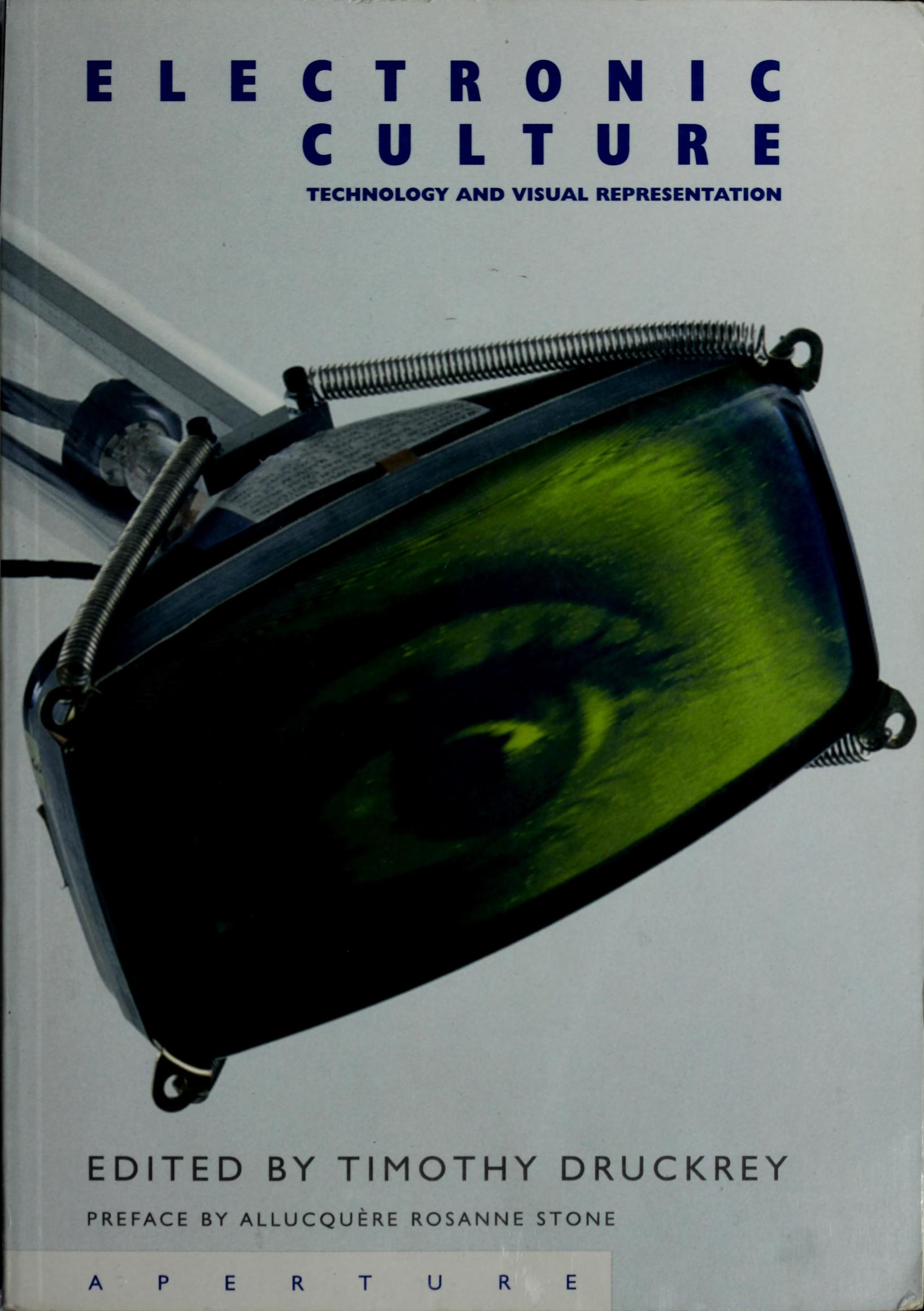Timothy Druckrey (ed.): Electronic Culture: Technology and Visual Representation (1996)
Filed under book | Tags: · cybernetics, cyberspace, interface, machine, media, media theory, networks, photography, representation, software, technology, theory, virtual reality

“A rich compilation of essays by some of today’s leading theorists and media critics, this book gathers a series of explorations into diverse forms of visualizations in a cultural environment wired into the global network. With its emphasis on the impact of the digital revolution in the late 20th century and the historical context in which it arose, Electronic Culture could not be more timely or relevant.”
Texts by Vannevar Bush, Martin Heidegger, Hans Magnus Enzensberger, Jean-Louis Comolli, Kathy Rae Huffman, Lev Manovich, Vilém Flusser, N. Katherine Hayles, Siegfried Zielinski, Slavoj Žižek, Friedrich Kittler, Sherry Turkle, Pierre Levy, Hakim Bey, Adilkno/Geert Lovink, Critical Art Ensemble, a.o.
Preface by Allucquère Rosanne Stone
Illustrations by Critical Art Ensemble
Publisher Aperture, New York, 1996
ISBN 0893816787, 9780893816780
447 pages
Review: Andreas Broeckmann (Leonardo, 2000).
PDF (155 MB)
Comment (0)Luciana Parisi: Contagious Architecture: Computation, Aesthetics, and Space (2013)
Filed under book | Tags: · abstraction, aesthetics, algorithm, architecture, cognition, computation, computing, cybernetics, design, evolution, feedback, infinity, information, interaction design, knowledge, media, metaphysics, networks, neural networks, philosophy, processing, randomness, sensors, software, space, temporality, time, topology, variation

“In Contagious Architecture, Luciana Parisi offers a philosophical inquiry into the status of the algorithm in architectural and interaction design. Her thesis is that algorithmic computation is not simply an abstract mathematical tool but constitutes a mode of thought in its own right, in that its operation extends into forms of abstraction that lie beyond direct human cognition and control. These include modes of infinity, contingency, and indeterminacy, as well as incomputable quantities underlying the iterative process of algorithmic processing.
The main philosophical source for the project is Alfred North Whitehead, whose process philosophy is specifically designed to provide a vocabulary for “modes of thought” exhibiting various degrees of autonomy from human agency even as they are mobilized by it. Because algorithmic processing lies at the heart of the design practices now reshaping our world—from the physical spaces of our built environment to the networked spaces of digital culture—the nature of algorithmic thought is a topic of pressing importance that reraises questions of control and, ultimately, power. Contagious Architecture revisits cybernetic theories of control and information theory’s notion of the incomputable in light of this rethinking of the role of algorithmic thought. Informed by recent debates in political and cultural theory around the changing landscape of power, it links the nature of abstraction to a new theory of power adequate to the complexities of the digital world.”
Publisher MIT Press, 2013
Technologies of Lived Abstraction series
ISBN 0262018632, 9780262018630
392 pages
For a New Computational Aesthetics: Algorithmic Environments as Actual Objects lecture by Parisi (2012, video, 72 min).
Reviews: Lecomte (Mute, 2013), Ikoniadou (Computational Culture, 2014).
PDF (24 MB, updated o 2021-10-28)
Comments (2)Computational Culture, a Journal of Software Studies, Issue Four (2014)
Filed under journal | Tags: · computing, database, facebook, filesharing, networks, social media, software, software studies
“What marks much of the work presented in this issue of Computational Culture is its endeavour to pay more analytically precise attention to socio-technical formatting of the present, based on a common assumption that the specificities of computational forms are fundamentally constitutive of that present.” (from the Editorial)
With articles by Paul Dourish, Irina Kaldrack and Theo Röhle, Benjamin Grosser, Dennis Tenen and Maxwell Foxman, Alex Taylor, Jasmin Fisher, Byron Cook, Samin Ishtiaq; comments by Geert Lovink, Mark Marino; and a review section.
Editorial group: Matthew Fuller, Andrew Goffey, Olga Goriunova, Graham Harwood, Adrian Mackenzie
Published in November 2014
Open Access
ISSN 2047-2390

